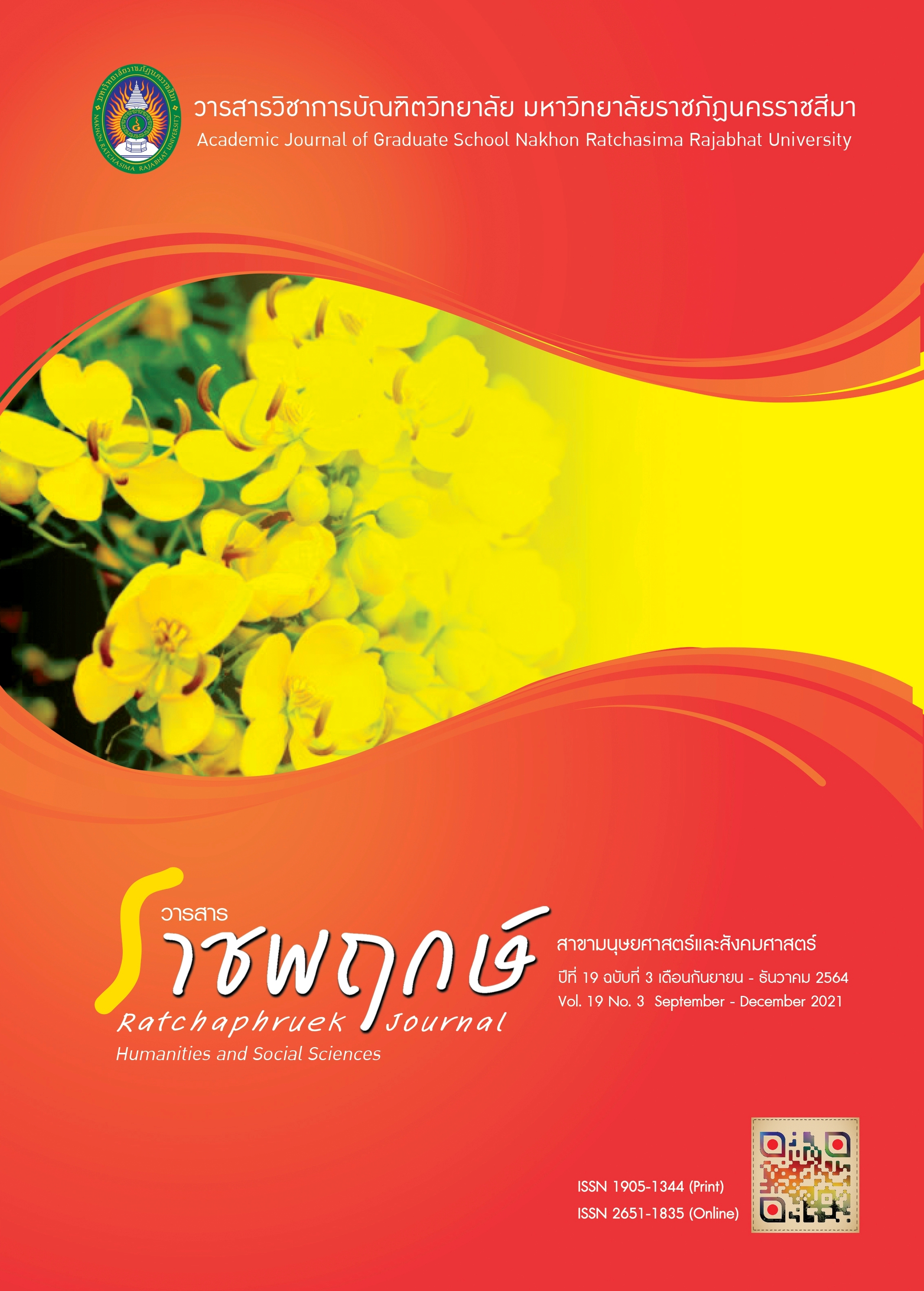Development of an Instructional Package Using Gamification Techniques for Enhancing Teamwork Skills in Research & Knowledge Formation Subject
Main Article Content
Abstract
The objectives of this research were to develop the instructional activity package based on gamification in Research and Knowledge Formation Course of Matthayomsuksa 2 students (Grade 8) to promote the teamwork skills; to study the teamwork skills development of students after implementing the instructional activity based on gamification to promote the teamwork skills; to examine the learning achievement of students to promote the teamwork skills. The sample group was a total of 30 students in Matthayomsuksa 2/8 of DebsirinSamutprakan School, Semester 2, Academic Year 2020, selected with the lucky draw, and cluster random sampling method. The research tools include 1) the instructional activity package based on gamification to promote the teamwork skills, 2) peer evaluation form for congruence on teamwork skills, 3)self-evaluation form for teamwork skills, and self- evaluation form for congruence on teamwork skills, and 4) work evaluation form. Statistics used to analyze data were mean (), Standard Deviation (S.D.), repeated measures ANOVA, and One Sample t-test.
The research results showed that the instructional activity package based on gamification consists of four components: manuals, content, teaching materials, and assessments.As a result, the results of teamwork skills development of the students before, during and after the experiment showed the difference with a statistical significance .05. Additionally, regarding the students’ learning achievement after implementing the instructional activity package, the students were qualified the criteria at 70% with a statistical significance .05.
Article Details
References
วราภรณ์ ตระกูลสฤษดิ์. (2549). การทำงานเป็นทีม (พิมพ์ครั้งที่ 1.) กรุงเทพฯ : ศูนย์ส่งเสริมวิชาการ.
เมธวิน ปิติพรวิวัฒน์. (2561). 21st-Century Skill: ทักษะแห่งศตวรรษที่ 21 เมื่อทักษะในโลกเก่า ไม่เก๋าพออีกต่อไป! สืบค้นเมื่อ 6 มกราคม 2562, จาก https://medium.com/base-thebusiness-playhouse/21st-century-skill
ชนมน ตั้งพิทักษ์ไกร. (2558). การพัฒนากิจกรรมการจัดการเรียนรู้ที่เน้นผู้เรียนเป็นสำคัญโดยใช้การเรียนรู้แบบร่วมมือ (cooperative learning) เพื่อเสริมสร้างทักษะการทำงานเป็นทีม กลุ่มสาระการเรียนรู้การงานอาชีพและเทคโนโลยี (การงานอาชีพ1) ระดับชั้นมัธยมศึกษาปีที่ 1 โรงเรียนดอนเมืองทหารอากาศบำรุงกรุงเทพมหานคร. วารสารศึกษาศาสตร์ปริทัศน์, 30(3), น. 158-167.
สาขาวิชาศึกษาศาสตร์ มหาวิทยาลัยสุโขทัยธรรมาธิราช. (2523). เอกสารการสอนชุดวิชาเทคโนโลยีและสื่อสารการศึกษา (20301). กรุงเทพฯ : ฝ่ายการพิมพ์ สำนักเทคโนโลยีการศึกษา.
ชนัตถ์ พูนเดช, และ ธนิตา เลิศพรกุลรัตน์. (2559). แนวทางการจัดการเรียนรู้ด้วยแนวคิดเกมมิฟิเคชัน LEARNING MANAGEMENT WITH THE GAMIFICATION CONCEPT. Journal of Education Naresuan University, 18(3), น. 331-339.
วชิระ อุดมรัตน์. (2560). การส่งเสริมพฤติกรรมการทำงานกลุ่มโดยการจัดกิจกรรมการเรียนรู้แบบกลุ่มร่วมมือแข่งขันร่วมกับเทคนิคเกมมิฟิเคชันสำหรับนักเรียนชั้นมัธยมศึกษาปีที่ 6 โรงเรียนยางตลาดวิทยาคาร. (ปริญญานิพนธ์ปริญญามหาบัณฑิต, มหาวิทยาลัยราชภัฏมหาสารคาม)
พิชญ์ อำนวยพร. (2562). การพัฒนาสื่อการเรียนรู้ประเภทเกมโดยใช้กลยุทธ์เกมมิฟิเคชันเพื่อส่งเสริมการคิดเชิงคำนวณรายวิชาพื้นฐานวิทยาศาสตร์ เทคโนโลยี (วิทยาการคำนวณ) สำหรับนักเรียนชั้นประถมศึกษาปีที่ 2. วารสารวิชาการศึกษาศาสตร์, 20(2), น. 68-78.


